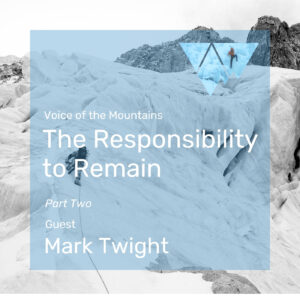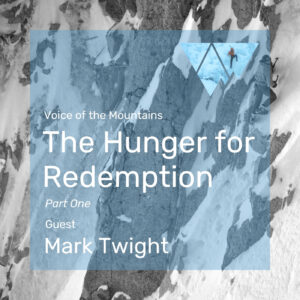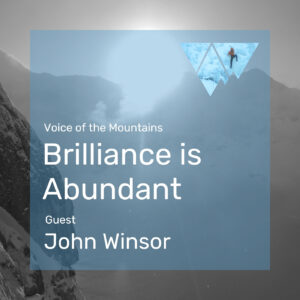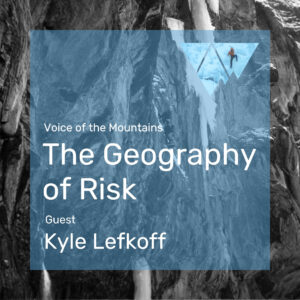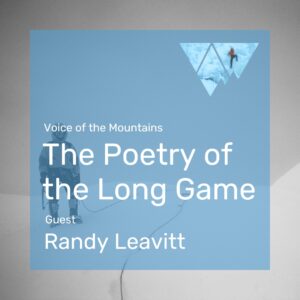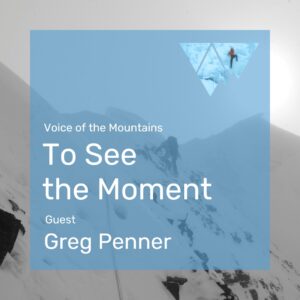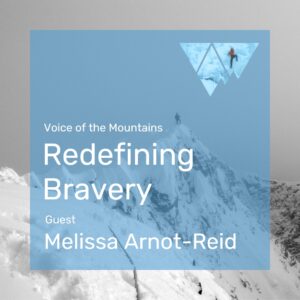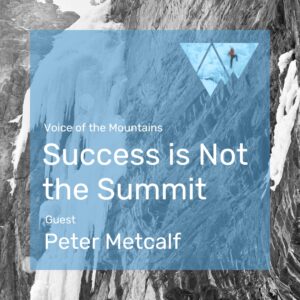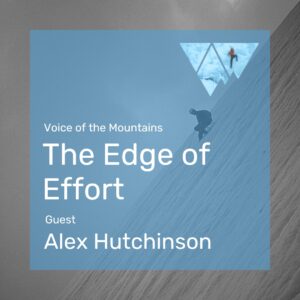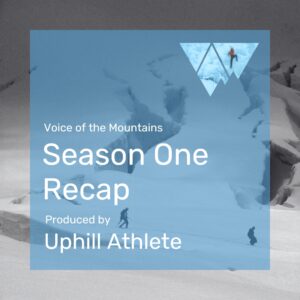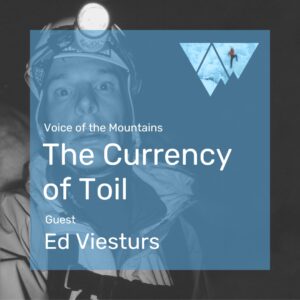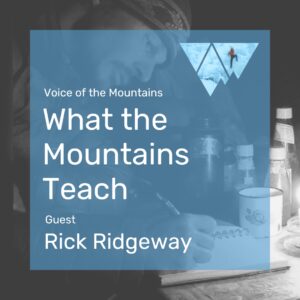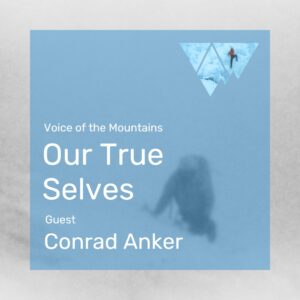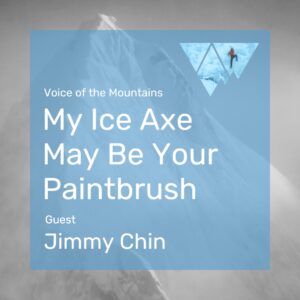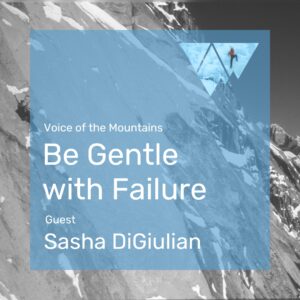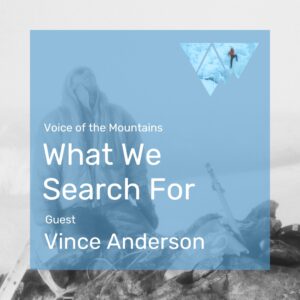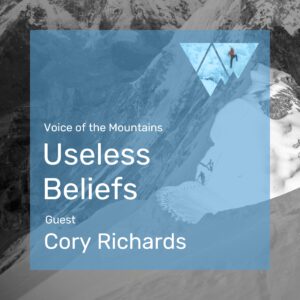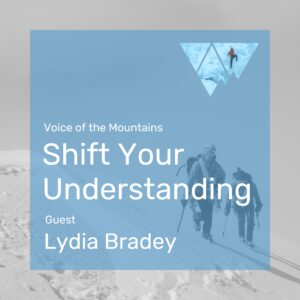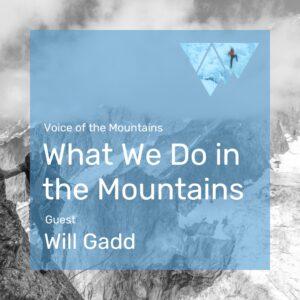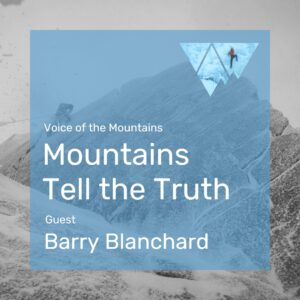Redefining Bravery
Guest Melissa Arnot-Reid
READ THE COMPANION ESSAY
Exploring the poetic soul of the mountains.
Voice of the Mountains explores the mental and emotional adventures found in discovering who we are and what we’re capable of. Here we engage in self-reflection, humility, and embrace the beauty and struggle of the alpine experience equally.
Listen to More
Season Two
Season One
Steve House
It’s time to ask the question, what does it mean to be brave in the mountains? I believe we’ve come to mistake bravery for boldness, for rope lengths run out for summit bids in the thinnest of air and for storm survive. But what if bravery isn’t found in those self-induced moments of survival? What if real bravery is something quieter? In this episode of Voice of the Mountains, Melissa, AAU Reid and I attempt to explore a deeper kind of courage. The kind that doesn’t shout, and the kind that doesn’t need a headline, the kind that asks you to sit with fear, with your shortcomings and to keep showing up anyway. And we talk about fear, but not the clean kind, the corrosive kind, the kind that seeps in when you’re alone, the kind we pretend doesn’t exist.
’cause we’ve been told that bravery is the absence of fear and Melissa helps us to reframe all of that. Melissa is one of the most accomplished American mountain guides of her generation. She has climbed Everest six times. She has summited without supplemental oxygen and successfully forged a path of her own and one of the most male dominated arenas in the world. But when I dug deeper into who she has become because of these experiences, I realized that her story is not about her achievements. Her story is about transmuting the accomplishments and those external validations into tangible, self-worth, self-belief, and empowerment to be her best. While not confusing competence with belonging, Melissa has crafted a different definition of bravery.
Bravery as agency. Bravery is choosing to act anyway. is being comfortable with vulnerability and bravery acceptance and bravery, as being the very seed and source. Of our resilience. If the summit is just a moment and the descent is the rest of your life, then bravery perhaps is what guides us home. My name is Steve House and this is Voice of the Mountains.
CTA: If you’re enjoying the show and want to take the next step in your training, join our newsletter and receive a free four week sample training plan. Head on over to uphill athlete.com/ let’s go, and once you sign up, you’ll instantly get a link to try out some of our most popular training plans. It’s a great way to get a feel for how we train our athletes for big mountain goals.
Check it out at uphillathlete.com/letsgo. That’s uphillathlete.com/letsgo.
Steve House
I want to start by saying that I really was looking forward to having you on this, on this, in this part of this discussion that, that we’ve been having in Voice of the Mountains, because one of the things that I really look up to you for is that you have been the I mean, not just you, but part of a movement, I would say, that has been creating or redefining a new archetype around mountain leadership specifically, and maybe leadership more generally. and defining it more in terms of resilience and inclusivity and humility and reflection. And that kind of is very much aligned with what uphill athlete is all about, right? It’s about the becoming.
And then when you add in things like, you know, and you’ve written about this very nicely about like working within a male dominated domain, like mountain kiting, working with mentoring, and you know, up and coming younger female guides, kind of harmonizing your personal dreams and goals with, you know, your own identity and who you really are. And i think that this, right I feel very strongly that this is the ah new mountaineering, the new mountain sports, the new voice that is emerging. Where did, where did that reflection, you know, is there, is there, if you look back on your life, is there a place that that kind of started?
Melissa Arnot-Reid
I mean, I think it’s super interesting because for me, it has always been that way. So I have never been a person who was good at having a single interest and keeping my sort of focus only on that one thing and not bringing with me my whole self and all of the various parts of me that are curious about different things.
And the mountains represented a place to challenge myself, a place to have both um immense discomfort and tremendous comfort and a real opportunity to have time to think through, you know, my, the big philosophical thoughts that are kind of always bouncing around in my brain around, you know, my purpose on this planet and all of our purpose on this planet.
And, you know, also,
Steve House
Do we have purpose on this one?
Melissa Arnot-Reid
Yes. Do we have one? and And so for me, climbing, like i was never I wanted to lean into a single focus of I am a climber, I’m a mountaineer, whatever, but it didn’t fit.
It never quite fit because I always had this different relationship with the mountains.
Steve House
Thank you.
Melissa Arnot-Reid
And so it was really foundational for me. And it’s been lovely to see how I think partially because of just visibility and access, you know, 30 years ago, how did you find out about a mountaineer? It was like a news clipping or something. um You know, now with the rise of social media and like a very look at me culture, which has both positive and negative aspects to it, you do get this more broad understanding of, you know, you don’t have to dedicate yourself your entire being to going on Himalayan expeditions to be a mountaineer, or even in my case, to be a mountain guide. I can be multiple other things as well. And this can look really different from maybe historically what we’ve believed it to look like.
And that has been you know, accidental in my work of like, it’s become really a cornerstone of what I do, but it is just fundamentally also who I am. I’ve always been a person who has said, i don’t know how upon my death, how will I be defined? Because it maybe I’ll be a chef and people will be like, she was this amazing chef.
And then someone will dig into the history of like, oh, do you know that she also was a Mountaineer at one point or something? mean, who knows? You know, like it’s sort of the
the um lack of ability to have a single focus, which I think has super large benefits and challenges, obviously.
Steve House
One of the things that I happen know about you, but you also wrote about and and were very brave, I think, in writing about your childhood and you wrote about how you were around a lot of volatility and how that helped you build what you called psychological armor.
How did that, like, tell us about that. How, how did you become that resilient child that was around that, that instability, but managed to, come out of it in in a positive way. I mean, that can have you know that can go both ways for people, right? Like that can that can that can crush people and it can turn into superpower.
Melissa Arnot-Reid
Yeah.
Steve House
What was that experience like for you as a kid?
Melissa Arnot-Reid
Yeah, I mean… It’s interesting because I think that depending on which way you look at my life, you could argue that it had some really negative consequences. you know And just because I am conventionally successful in that, you know by societal standards, I have an achievement chyron under my name or something to say that I somehow turned to this really challenging circumstance into something positive. And it is also true. I did. But it’s also really intertwined with, you you know, personal negativity. So for me, one of the really foundational things looking back that I can understand is that i had a really confusing sense of relationships with power from my birth as far back as I can remember, and both power with women and power with men, and I am, and power is a weird thing to say when you’re thinking about a child, you know, because it’s like you think about a power struggle with a toddler, but it was actually quite a lot deeper than that. It was this idea of your right to exist, which is sort of a power of its own. And foundationally, I had… I didn’t have this idea that I didn’t have a right to exist, but I had a very serious question about, am I deserving of existence? And so that was in on my interior self really caused a tremendous amount of conflict. And then I was looking at as far as I could possibly see as a child, which is essentially right in front of you, to your immediate surroundings, to your family, And then if you have school and support structure, maybe to that. And I could see that there was something consistent going on around me in that volatility. And it was that it wasn’t uniquely mine. You know, in my family structure, I wasn’t the only person that was experiencing this type of challenge. And so somehow, really early on, I understood and didn’t fully ever accept even now, but I understood like this isn’t my stuff. Like this isn’t about me. And so I can get out of this. And also it looked like an impossibly long road as a teenager. Like I’m never going to get out of this. because It feels like two years feels like a true eternity when you’re fifteen, thirteen. But I, thirteen, but I really had this idea like, this isn’t mine and this is going to give me a specific skill set that will come in use in my life. And I had this understanding as a kid that I didn’t have a lot of choices around challenging circumstances that I was going to find myself in. And so that’s true for us all, right? Like as a child, however you grow up, whatever your circumstances are, you’re going to find yourself in some discomfort that you didn’t choose. And for me, i really leaned into that as this opportunity to practice being really uncomfortable and still somehow staying afloat. And it didn’t always work. and it And I think it goes back to that idea of like that multi-focus, you know, like I was both present in my world, even as a very small child, and deeply lost in my mind, sort of thinking about the pontification of the universe and the purpose and what it all means.
Steve House
Can you paint a picture for our audience and for me about what that was really like, what you something that you experienced as a child that you can share?
Melissa Arnot-Reid
um my mother had a lot of interior challenges and she, that manifested in a way of, she seemed very self-confident to me as a child, but she was very, very vicious with her wounds and placing them on, well, I’ll say me, you know, in my experience. And So how that might look is something that she felt really insecure about, um such as the security of her place in our family, like whether my father loved her and was going to stay committed to her. She would assign that to me. and threaten my knowingness around the love in my family and assign like, you’re so you know you are so bad that nobody is gonna love you, including your father. He’s gonna leave you. And that was her wound, right? Like that was her fear. And she was assigning it to me. And so I would take this interior look at like, okay, what am I doing that makes me unlovable? I don’t know. And then how do I fix it?
Steve House
Mm-hmm.
Melissa Arnot-Reid
And instead of, you know, folding into myself and and sort of collapsing on like, I can’t fix it. I really was, you know, petulantly curious of like, maybe I can fix this. Or maybe this is just like, get through today because I know for sure it’s going to be different tomorrow. And it could be worse. And it was often worse.
But it also could be a break. And then I might get some footing under me. there’s this constant dance with you know, trying to understand, you know, and sometimes doing a really good job as a kid of understanding, like, I can’t do anything about this right now. And then also developing a deep well of personal questioning in my own life around unconditionality, you know, and it’s something that I’ve struggled with forever is this idea of I didn’t ever have a really good modeling from my origin that there was such a thing as true unconditional love and what that truly looks like. And even i would say unconditional love is like the deepest side of it, but unconditionality in anything, it’s always felt like everything was temporary. Everything could be lost.
Steve House
Hmm.
Melissa Arnot-Reid
And there’s something really um activating if that’s your mindset, right? Because you realize there is this incredible impermanence to both good and bad. And that’s the upside of that, right? Is that I could see that the bad was also impermanent.
Steve House
Hmm. Yeah. There’s a ah quote I like that I want to read right now. It says from a, I don’t have the source right here, but it’s truth does not offer you a path that is frictionless and smooth and free of blemishes. Truth with a capital T asks you to be willing to lose everything, to get closer to her, to have the courage to be demolished in her honor by opening up wider and wider to the staggering, awesome, complicated, heartbreaking, brilliant life. to bear witness to what is joyful, but also to what is painful with the same curiosity, respect, and love, because we live in a world of the
Melissa Arnot-Reid
Mm-hmm.
Steve House
because we live in a world of darkness and light, and they are both great teachers. This is really, this quote has been one, it’s i’ve it’s so handy for me, because that is the theme for me of Mound this season of Voice of the Mountains. And you just like really, really dug into it eloquently there. What is it, you know, we’re both parents. You have two children. I have two children. Our children are actually some pretty similar ages, kind of elementary school, pre-elementary school. And they are forming their identities. They are starting to understand what you said, the conditionality, like, am I loved because I am doing
Melissa Arnot-Reid
Yeah.
Steve House
I don’t know, my homework or cleaning up my room or, or those kinds of things. So how does this experience that you’ve had and this processing that you’ve done translate into your present day role as a mother?
Melissa Arnot-Reid
It’s very interesting because, you know, that my relationship with becoming a mother is complicated by the fact of my identity in the world as an adult has largely been, you know, ah a feminine figure in masculine spaces. And mothering societally seen as a soft skill and, I had long been fearful of becoming a mother, not because I didn’t want children or to mother. I deeply, deeply did. i knew that that was something that was vital to experience in some capacity in my life. But I was so afraid that I already had to put on such a facade to seem strong enough to be, you know, to for me to perceive that my peers see me as an equal, though, of course, that’s never happened. It never is going to happen. It’s I’m a It’s a different animal altogether. But I really feared that if I leaned into this mothering, it would be a soft season, as I have thought of it. And it has been a soft season, but not in the way that I anticipated at all. Melissa Arnot-Reid
And it’s been one of the most incredible experiences be witness. For me, i my first born is a girl, is a daughter. And you know I was very aware of the fact of coming from a background of a challenging mother relationship and me being a daughter, I didn’t want to sort of like hand her my wounds.
Steve House
Yeah.
Melissa Arnot-Reid
And of course, inevitably, I knew I would in some way, because that’s just you know deeply the human condition. Our intentions and aren’t going to save us from our natural way of doing that. And it’s been done for all of ah you know history and time, I’m sure. But I was very aware of it. And what ended up, yeah, yeah, I mean, hopefully, right.
Steve House
Yeah. But awareness is the first step, I would say, right? Like in changing the pattern, like not changing.
Melissa Arnot-Reid
It’s like, again, I’m certain the, the wounds that my daughter is going to have from being in my family are going to be so far different from the ones of, that I had from being in my family of origin. And, um, I don’t, you know, people have asked, like, do you have more perspective or respect for the plight of your own mother in becoming a mother. And yes and no, you know, because my mother had a really challenging origin as well. And that created these really foundational wounds that made it very hard for her to be present and and give unconditional love. Like it’s not a skill that she knew. And I deeply compassionately understand that that is not, you know, some vicious um and malicious flaw of hers that she’s attempting to hurt her children.
Steve House
Mm-hmm.
Melissa Arnot-Reid
She can’t not do that. And I feel compassionately about that. But I also was exposed to a really challenging set of circumstances. And I have created, i can say with great certainty, this container around my family where it’s quite certain that the love is very reliable. And it’s one of the really coolest things that happened for me was when my daughter was about two, and I had always heard through my therapeutic process, you know, how much of my interior voice was the voice of my parents. And I resisted that at first. And I was like, no, it’s not. And then I realized that like both good and bad, anytime that like my interior voice would rise, I’m like, wait, that is the voice of my parents for sure. And it didn’t hit until I saw my daughter, you know, carrying this, one of those like inflatable bouncing cow things that you sit on as a toddler. And she wanted to take it upstairs. And she was talking to the cow. And she was saying, you know, come on, cow. Kaya, and my daughter’s Kaya. And she said, Kaya, like, you’re so strong. You’re so brave. You got this, Kaya. You can do this. And I, like, went back downstairs and, you know, like, wiped a little tear off my eye. And Ijust thought of in the two years of her life how many times those words had come out of my mouth to her. And it’s like, okay, this is, I’m watching my voice become her interior voice. And I now see this power of importance. And so we have like a baseline set of family rules. And one of the family rules that feels most essential, and I write remind myself of it every day, and I remind myself for myself, is that we don’t punish mistakes. Like mistakes have consequences, naturally. That’s the whole premise of a mistake. There is a consequence. we don’t punish mistakes. And so we’re free to make those mistakes. And that’s that idea of, you know, this essential dance with the truth. And I have been thinking quite a lot lately around, you know, the very common, um, reaction that I get to sharing my story, which is like, wow, this is really brave. And I’m very curious about why, what is, where is the bravery? Like where in lies the bravery? Is it because it, I, theoretically, if I just have survived, that’s not the bravery we’re talking about, right? It’s this, it’s this dance with the truth. And it’s something that is um really, really scary, because no matter what your background is, and who you are, mistakes are scary.
Steve House
Thank you.
Melissa Arnot-Reid
And the truth contains in it a lot of personal mistakes. And again, mistakes have consequences. But I really want to live in a life where there’s not punishment. And I want to create that environment for my kids. And that’s how I’m like viscerally experiencing this life of, you know, little people who i see as my teachers. And, um you know, I really am here to try to learn from them and and create hopefully a container of learning for them as well to you know, make them happy humans in a society that lacks happiness.
Steve House
Yeah. Yeah I mean, you have some pretty good direct evidence that you are doing exactly that. So congratulations.
Melissa Arnot-Reid
Yeah.
Steve House
I mean, that’s that’s amazing, first of all. And second of all, I wish that for all of us, right, that we can have that kind of level of self-talk.
Melissa Arnot-Reid
Yeah, thank you. I do.
Steve House
And it’s really hard. Can we just, like, say that it’s really, really hard to do that,
Melissa Arnot-Reid
I don’t have it. I don’t have it. You know, like, personally, what I wish for… and and And also it’s somewhat, I think, like personality dependent because my sweet, tender, sensitive son, who is almost three, it my voice to him is the same, right? If I say like, you know, buddy, you’re so strong, you got this. He will always say to me, mama, I not strong. And it’s like, he has this like, or he will he’ll say like, i I not brave, mama, I not brave.
Steve House
Interesting.
Melissa Arnot-Reid
And I would say like, depending on what you how you’re quantifying bravery, he does a different constitution of bravery than my daughter does, like inside of who he is. And so it’s also caused me to have to like, push the pause button and say, parent the person in front of me. Now, I don’t have a parenting method. I try to remember to wake up and look at the kid in front of me and remember that we’re all like, phenomenally dynamic beings and becoming and unbecoming constantly, all of us, no matter you know if we think this is our first time here or many times here. like we There’s a tremendous amount of unbecoming in the becoming. And i just have to try to look at it for what it is. But you know it’s really hard. That’s like a high lofty, don’t anybody mistake the way I’m talking about my parenting as though it’s not like, you know i also am regularly told that my snappers are coming out too much. I’m like yeah feeding my kids Cheetos on Wednesday night because that’s all that they will eat. So there’s lots of imperfection in the pursuit of perfection for sure in all aspects of life.
Steve House
A hundred percent. You know, and I’m going to share a spoiler as my kids are just a little older than yours is, you know, what I experienced.
Melissa Arnot-Reid
No, don’t tell me. Don’t tell me.
Steve House
You’re most, you’re most.
Melissa Arnot-Reid
oh
Steve House
I, you know, I’ve used this word brave a lot too with my boys. And now, you know, they’re like Franzi, almost 10. And he asked me pretty recently, like, daddy, what does brave mean? Like he didn’t really understand, like I’ve used the word for now eight years, nine years.
Melissa Arnot-Reid
Yeah. Yeah. He’s like, what are you talking about? Yeah.
Steve House
and he’s like, you know, if I really think about it, I don’t know exactly what that means.
Melissa Arnot-Reid
Well, what does it mean to you? Because I have been engaging so deeply with this concept of bravery lately because I’ve been hearing it and it feels, it doesn’t feel hollow, but it feels, i’m i feel I’m curious. I’m curious what does that mean in context, of course, but like, what does bravery mean to you?
Steve House
Yeah, it’s a great question. i want to reflect it back to you. and and because one of the things I want to explore with you today is this idea of fear, because bravery is, um is a anecdote in many ways, I would say to, to fear.
Melissa Arnot-Reid
Mm hmm. Yeah.
Steve House
And so, and fear is a, is a theme in, you know, your thinking, your writing has been in my thinking and writing as well. It’s been a frequent theme on this podcast. It’s, people in the uphill athlete community are doing scary things almost by definition, whether it’s running the first, you know, 10K or 50K or going to climb Denali or whatever it is.
Melissa Arnot-Reid
no of course.
Steve House
These are all, you know, things that are scary for people.
Melissa Arnot-Reid
Mm-hmm.
Steve House
And what, how do you model this? Or first of all, maybe I should ask, how has that been and you share this in your book a little bit, but like how has fear and your self-talk around fear kind of started out? How did it start out for you?
Melissa Arnot-Reid
Mm-hmm.
Steve House
When you were, I’m going back to like when you’re a teenager in in Montana and you know sort of starting to have these ideas of of really getting out of of that area and getting out of that situation. I mean, that’s already bravery in a lot of ways. And there’s a lot of fear. You didn’t know how the world worked. It was big. It was immense. You were small.
Melissa Arnot-Reid
Yeah.
Steve House
How did that work? How did that work?
Melissa Arnot-Reid
Well, so it’s really interesting. So um if the idea of bravery is like to be courageous, so I think about what courage is, and courage the idea of not being deterred by pain or fear. That is never. So on one level, quite actually, i was not deterred in so much that whether I felt pain or fear, I continued forward, right? But I actually think it’s quite like, complicatedly different where I was deterred. The like, I was detoured, I’ll say, instead of deterred, maybe um by pain and fear. And so When I, you know, I, I talk about it in my book, I went through the experience just like a, you know, pretty average, challenging early childhood time of like a complicated relationship with a parent. Lots of people have experienced that. Mine was not like enormously exceptional in any way. um You know, i talk very about my own specifics.
Steve House
Sure.
Melissa Arnot-Reid
It was my experience, but it wasn’t, you know, enormously exceptional or abusive or, you know, anything else.
Steve House
Sure.
Melissa Arnot-Reid
I, it was fine. And it laid this groundwork of a truly, really terrible, very exceptional experience that I had when I was right at the precipice of becoming a young woman at 11 years old, where a predatory adult took advantage of me in a multitude of ways and took advantage of me physically and then also quite possibly more harmfully created an environment where my parents were arrested at my you know my I can’t say my responsibility because it’s really complex and I talk about the complexity of it in the book and what happened. but um And I lost everything around the foundational aspect of even the unconditional love that I had of my origin family. i now completely quite called into question regularly as my whole family tried to reorient ourselves and find our feet underneath us. And of course, at the time I was, you you know, a preteen and a teen and I only had a view of myself. So I wasn’t considering how it was impacting other people. Now as an adult, I can recognize that, you know, everybody in my family was really struggling to figure out how to exist in a new reality that they didn’t choose. And so this required an element of courage. And so it was one of the very first truly deep experiences that I had interacting with discomfort, danger, and pain, and choosing how to proceed. And because of the fact that this danger, discomfort, and pain of this predatory adult relationship that I was in as a you know child and then a young woman, I didn’t get to choose how to interact with it.
Steve House
Mm-hmm.
Melissa Arnot-Reid
I was not on a climb that I got to assess the risk of and determine that the risk was too great. And also, i think about that all the time now, like, do we ever know what the risk is? Because you only know the risk once you know the outcome, you know, and risk and consequence and what that all actually looks like. But I think about it all the time of like, I can quite clearly say now that I didn’t get to choose to, you know, engage with that discomfort. And so to be brave for having gotten through that was just to live, right? So the bravery existed in just existing. And it also shaped something inside of me that has been both you know very defining in my life and how I engage with challenge, danger, discomfort, pain, and extremely toxic in how I engage with you know challenge, danger, discomfort, and pain. Because I both knew I could survive ah really existence-crushing experiences that were completely out of my control. And I could get through it. And there is a terrible thing that can occur when you discover that at the age of 12. You know, your relationship to discomfort is incredibly skewed.
Steve House
Mm-hmm.
Melissa Arnot-Reid
And so I have always said this about myself in a very light way without any context of people ask like, you know, what makes you well suited for the mountains? Because I’m just, you know, physiologically average. I don’t have like some exceptional, you know, single skill. I have to try really hard to be good at any specific activity, sport or discipline. My physiology at altitude is all kind of normal and unremarkable. But I have, I’ve always said, like, I have a really soft touch on the dial between discomfort and danger. And that’s not true. I mean, it is true. But it’s also a toxic manifestation of experiencing such intense discomfort that I actually have a very unhealthy relationship with danger and discomfort. And I will justify types of danger as discomfort because it is a soothing feeling to my own past to say, look, that wasn’t true danger. That was just discomfort. I was just uncomfortable. It’s like, well, actually, what is danger? Like, what is the consequence we’re trying to avoid? If it’s only death, if that’s the only thing that we’re quantifying as danger, that’s a very narrow definition window and guess what you’re not avoiding it so like you know that danger doesn’t quite work for the avoidance of death because it is coming for you and and so it’s really complicated you know now it’s like you can see the rabbit holes that exist within my brain in this topic
Steve House
Yeah. and Yes. Yeah, and and not just yours. Like I think everybody that is out there doing things that have a significant amount of risk because as you say, you don’t actually know the risk, you only know the outcome. So you only know the risk in in hindsight.
Melissa Arnot-Reid
Mm-hmm.
Steve House
And so when and in mountaineering and in climbing and in alpinism, I think we often make it very binary as you put it in the sense of did I live or die? And that is a ah gross oversimplification and ignores the fact that we’re one day going to die. So in a way it’s a, it’s a false win if you will, you’re just not going to die that day or today.
Melissa Arnot-Reid
Yeah, yeah.
Steve House
And I think that, you know, Reinhold Mesner talks about in some of his early books about becoming what he called a creature of the wall. And I always loved that phrase because for me, like I viscerally understood that because I experienced that in my own climbing.
Melissa Arnot-Reid
Yeah, what it means.
Steve House
And it was like, I got to a point where, you know, at various times, not just like one day, but like many times throughout my, my climbing, including as a young, young, very young climber,
Melissa Arnot-Reid
Yeah.
Steve House
where I was just like completely comfortable with what was going on around me. And I was so sort of relaxed and, and that’s, that’s what he was talking about. Right. I was, I was, you know, stones were falling and, you know, there was like, you know, death was flying, potential death was flying all around me. And, I was just like, yeah, shoot eating my sandwich, having a sip, drink of tea.
Like I’m safe. Cause I’ve got this little 30 centimeter roof of rock over my head. And, know, I can just like tuck in here and same thing happens to people in war zones when they, you know, and in other traumatic situations, we find these, these ways to, to sort of exist within that.
I want to come back to the definition. So I have a very specific definition of, of bravery which, and would define it as ah the ability to act or find agency in spite of, or, I mean, you can, or because of, or with fear. I think that this is how I talk about it with my kids. Like my, you know, if I take my boys climbing, You know, we do very easy climbs. They don’t know anything ah about my climbing, right? Like I haven’t told them anything yet. They’re going to find out someday and I don’t care. But the the only thing they know is I tell them that daddy is a mountain guide because that’s the only way they frankly listened to me. But, um, when I talk to them, when they say, daddy, I’m scared.
Melissa Arnot-Reid
Yeah.
Steve House
ah my initial reaction what I used to do was like try to remove the fear and like wrap them up in a blanket of safety of some kind. And now I realize like, oh, that’s that’s just creating this need on their part for me to come over and like solve the problem.
That’s like, I can’t do, like that’s that’s a dead end, right? I can’t always be there to solve their problem.
Melissa Arnot-Reid
yeah
Steve House
So now, you know, they say, daddy, I’m scared. And I say, you know, that’s that’s good you’re scared because this is dangerous. And what, what action can you do next? What can you do? Can can you step over to there? Can you reach that hole? Can you clip into that anchor? Those kinds of things. And I, and I like this discussion that comes out of this with my kids much better than what I was doing previously, where I would just grab the sling from their harness and clip them into the anchor myself because, and then tell them they were safe.
Melissa Arnot-Reid
Right.
Steve House
and show them all the ways they’re safe.
Melissa Arnot-Reid
Yeah.
Steve House
That was what I used to do. And now I’m really trying to be like, Oh wait, I need to teach them how to have agency and how to take action and how to break down the problem and get through it in a, in a positive, constructive way.
Melissa Arnot-Reid
Well, what’s interesting is your concept of bravery is really intertwined with the ah the end evolution, which is resilience, right? And so you see bravery in that really specific definition as the formation of resilience.
Steve House
Hmm.
Melissa Arnot-Reid
And I think that that is totally correct. I mean, that is the exact… you know, very action and result-oriented way to think about this really, um like, loose concept that’s hard to pin down because it is so subjective to the situation and and whatever. It’s not so fixed and finite. And that’s really beautiful. And I think that that I love because… ah you know I’ve personally interacted with like resilience is my goal. and resilience It’s my goal for my children and it’s my goal for myself. And resilience is really difficult to create in comfort ah because we have to it’s the knowingness that you can get through this moment.
Steve House
Right.
Melissa Arnot-Reid
you know And it’s, again, like we’re taking out the you know binary fact of like death and life is the end result. I don’t know that that is the end result, but like like that end goal. um
Steve House
right
Melissa Arnot-Reid
But this idea of and it’s funny because with my daughter, i I watched it happen, too, where it was like, what is I’m so brave and like, what is my goal for her? And and we used to talk about it because she’s like a really metaphorically driven thinker. And she would come up with like different examples of how i she was thinking about something I was trying to teach her. And this idea she would talk about when she was a little bit smaller, like around four, when she was really starting to ride her bike on a lot more varied terrain with more consequences.
Steve House
Mm-hmm.
Melissa Arnot-Reid
And she we would go down the driveway and she said like, it’s so hard to miss all of these bumps. I can’t do it It’s just too small of an area. And I was like, girl, your goal is not to miss the bumps. Your goal is to figure out how to get down the driveway, hit the bumps and not let it end your ride. You know, you might fall off. You might figure out how to get over the bump and be like a little uncomfortable for a moment. And we she says it to me all the time of when we’re having a tricky situation. She’s like, this is just this is just the bumps. We just got to get over the bumps. You know, it’s like, am I just I’m probably teaching my daughter how to like speak in cliche, which is a very correct thing of a mountaineer’s child to do. But um it is really beautiful.
Steve House
yeah
Melissa Arnot-Reid
to this idea of like, our goal is not to win. Our goal is not to, you know, whatever that is. It is just to build this ability to hit the bumps and not try to, yeah, fix it. Like the fixing it.
Steve House
Is it cliche or is it just a useful metaphor? I mean, doesn’t, I think that cliche has this little,
Melissa Arnot-Reid
Yeah, I think cliche is a useful metaphor. I think that’s the beauty of it.
Steve House
Yeah. Yeah.
Melissa Arnot-Reid
That’s why it’s a cliche for a reason.
Steve House
When you have talked about fear ah um and specifically when you were writing about, i don’t want to as spoil anything for your future readers, but our after your ah there was an accident involving a crevasse and
Melissa Arnot-Reid
Yeah.
Steve House
You talked a lot about fear and how that, and and I’ve experienced this in my own at various times in my own mountaineering journey, like been involved in some, some situation that I didn’t choose to be a part of, as you put it.
Melissa Arnot-Reid
Yeah.
Steve House
And, um and, and, and then you’re there and it’s terrible. It’s absolutely and horrible. It’s the worst. And you have a lot of fear at the time how, you know, there’s there’s different types of fear. Like what we’ve been talking about, I think is kind of the nice clarifying fear, like, oh, I’m scared of that.
Melissa Arnot-Reid
Right.
Steve House
So I’m going to avoid it or I’m scared of that. So going to take this action. But there’s also ah like a corrosive fear. Like ah there’s a ah fear that has like resentment in it. Like I didn’t choose this. Like I didn’t choose to be put in this situation. You know, and then of course the logical next step is the blame step. Like you put me in this situation or you climbed out outside of your experience level and ability and created this.
Melissa Arnot-Reid
right
Steve House
and Now I have to blah, blah, blah. And, and this framing while super easy and super common and it appears to have a very lot, you know, based in logic, right. If then kind of logic, you know, how how can we how can we as a community start to distinguish between oh fear and and experience and trauma that is constructive, that is helpful, that is that is a starting point for growth versus the kind that causes resentment, you know, all the all the, not just resentment, but like actually kind of, I want to say hatred, like almost like really strong, deep, like f you kind of, you know, strong feelings.
Melissa Arnot-Reid
Yeah. It’s interesting because just as you’re describing this, and I can think about those, you know, very more amoebic types of fear that have, you know, not just instantaneous consequences and outcomes, and then you, you know, take it, reflect on it and move on in your world. But it is this idea of, um, Yeah, you I don’t think you’re even aware when that’s happening, like the the blame and the resentment and the hatred. and And when I was reflecting and deciding what stories of my life to share and put into this book that I wanted to have a really specific narrative journey, I tried to write in the voice of who I was at that time, you know, and it’s it was really…
Steve House
Hmm.
Melissa Arnot-Reid
incredibly both ah informative and cringy and you know all of the things, and also healing, to go back to the voice that I carried inside of me at that moment when I was experiencing those types of fear and my reaction to it was, yes, to blame, um to defend, to to Because I think that this idea of agency, which is potentially like on a very big level, somewhat of a fallacy, um that there’s like there is individual agency in moments, but you know, like, I don’t know. There’s a lot of ah interaction with things we’re not choosing, but it’s just a very essential part. I think that agency is a really like um very sexy concept to be attracted to this idea that and autonomy. And like, I think it’s what but I can speak for myself. It’s what drove me in the mountains because I had this sense of very clear, um, feeling and my, of a feeling that I, that I could point to and I could show it to you of my agency, my choosing, my, you know, actions result in this. And also at the same time, like a bazillion other things are playing into this, including nature. And it’s one of the things that’s always felt so alluring to me about nature is this dichotomy of you get to have choice agency And autonomy. And you are interacting with a being that is completely dynamic and you get no notification of what’s coming. And there’s some so that’s where the fallacy kind of starts. And I think of that in, you you know, that replicates in all relationships that we have in all relationships, spaces that we exist in, no matter who you or where you are, you have that experience going on. um And it’s probably like the ego versus like you know actuality of like what we believe we are controlling. And I think that so that that relationship with fear specifically, where you have this resentful reaction to fear occurring, is very ego-driven. You know, it’s very, it’s it’s fear as failure. It’s this concept that societally I think we’ve ingested for a really long time, and I think it was a function of surviving, ah not even surviving, it was a function of sending people into war, and so that they would feel noble, and the that the fear, you know, is this essential component and, you know, necessary, and that, you Overcoming it or something is winning um or or being willing to die in the face of, you know, real actual danger is somehow noble. And so failing in some way um is less noble. And not going in, not facing it. And it is this idea of, it’s really entrapping idea, I think, around like achievement and the mountains that is that how we celebrate people in the mountains and how so deeply individual the experience is on a really like granular level for the person in the mountains. And you and I have been it widely varying experiences from one another in the mountains that are super different.
And our interior selves, we’re having our own deeply personal experience there as well. But the world puts us in a category that’s very adjacent um to one another, you know, of like achievement and failure.
Steve House
Sure.
Melissa Arnot-Reid
And so, and our relationship with then fear and failure um and how the ego just really deeply plays into that and doesn’t allow you to Because ah the the the solving of that in so many ways is reflection, right? And there’s a problem with that because in fear, it’s very hard to reflect. It’s very hard to have a reflective stance when something feels, you know, it taps into the dinosaur brain of our being threatened. It’s really hard to like open the philosopher side of your brain and ask like, what does it all mean? And what’s it all for it? And to take out the necessary elements of fear that keep us you know alive, hopefully, And also don’t keep us alive. Like, I don’t know.
I have all of the the conversations that I hear and I engage in, in especially talking about climbing and, um you you know, this we’ve decided, I guess, like societally, a ah ah categorically risky activity that we’re just going to call it mountain in climbing. And so you are a person who is now, you know, a fear seeking person or a person who has like a really different relationship with like adrenaline and you know you know this as well like the adrenaline side of the mountains is really when shit is terrible when it’s gone horribly wrong like it’s not what you’re there for and I don’t say this to like activate somebody who’s a
Steve House
What you’re there to avoid.
Melissa Arnot-Reid
You’re there to avoid. Yeah. And I’m not a gravity sports person. Like I don’t enjoy like whitewater kayaking and like fast downhill activities because of I don’t really like being in that spiked state of reactivity. Like being in a really slow meditative state of reactivity, which is like want to walk a 360 degree, know, full dimensional walk. full dimensional view around every choice and experience that I’ve ever had and that I ever will and analyze it. And, you know, speed doesn’t allow for that. And so, and that’s sort of like that fear relationship though, too, is that, um you know, it doesn’t allow for you when you’re in that state of fear, it doesn’t allow for you to analyze what that actually is or what your motivations are, and how you interact with it. So I think it’s generally speaking like, also I want to acknowledge, you know, we are talking in a way um that does fall into some of the traps of, um especially as climbing as a sport, all disciplines of climbing has risen um in usership. Most people, it’s not dissimilar to how we experience parenting, right? Like when our kids are experiencing fear, their fear is super real, even though we know the consequences to be whatever the consequences may be. And by and large, most people who are climbing aren’t dealing with like true life and death consequences to their individual actions throughout their climb. You know, can that be different? It can, obviously.
Steve House
Sure.
Melissa Arnot-Reid
But, you know, we really we extrapolate these stories of like things going wrong and we look at that really closely. And I think it’s a again, it’s soothing to ourselves. And, you know, this as a person who’s experienced this. You know, ah the consequences of being in the mountains and things going differently than you thought they would and really having to confront all of the complex feelings that go into that and then how the world engages with your story as like a salve to their own decision making in the future um to to prevent themselves from experiencing that fear, pain, risk, um you know, which who knows that we can.
Steve House
I want to go back to something you said and started us down this rabbit hole a little bit because I stopped you when you started to say, well, you know, we have agency, but then there’s a, so I think of this agency and then the other stuff, I think of it as deterministic and probabilistic. Like the deterministic is what you can make choices around.
Melissa Arnot-Reid
here
Steve House
Yeah.
Melissa Arnot-Reid
Yeah.
Steve House
And there’s a lot of that in the mountains. And the probabilistic is what you were talking about, interacting with the force of nature and its rawest form and having to, you know, no choice but to accept what what happens in in that way.
Melissa Arnot-Reid
Right.
Steve House
And in most cases, that actually determines far in the mountains, especially the big ones, that determines far more of the outcome than the deterministic choices.
Melissa Arnot-Reid
Yeah.
Steve House
by the time you get to the level which you’re trying to climb Everest without supplemental oxygen, the deterministic pieces have all been put in place. It’s almost purely probabilistic beyond that.
Melissa Arnot-Reid
Yeah.
Steve House
And I remember having this discussion with Vince Anderson right before we climbed Nanga Parbat because he was getting nervous because our acclimatization and everything, we were at the end of our time, and he was getting nervous that our acclimatization was kind of waning and we were losing our window.
Melissa Arnot-Reid
Mm hmm.
Steve House
And we had this conversation and there was, it really calmed us both when we realized, yes, if we get the opportunity and everything lines up, we are a hundred percent sure we can do this.
Melissa Arnot-Reid
Mm-hmm.
Steve House
it can be that like, we will walk away from the space camp, never having stepped foot on this route and the world won’t care, won’t know. we won’t, we’ll, we will sort of be pretty sure, but we wouldn’t have had that like proof. And as it turned out, of course, we had the opportunity to sort of prove that to ourselves and beyond that to the world.
Steve House
And so when you interact with the world, I mean, I think you have a different experience. I mean, obviously yeah you’re younger and you’re also a different gender than I am. And so when you interact with the world and the world looks at your achievements in the mountains, how do you, what’s that relationship between what i’ll just say they see as your achievements and your value and what you see as your achievements and your value?
And how do you balance that that? How do you maintain your own, what you feel truth of your identity when the narrative from them, I’ll just say, it be different?
Melissa Arnot-Reid
Mm-hmm. Yeah.
Steve House
how does that What is that internal process like for you and how has that unfolded over time?
Melissa Arnot-Reid
ah yeah. Essentially, that is the whole journey of my book, right? Is this idea of thinking that…
Steve House
Hmm.
Melissa Arnot-Reid
I could control what they saw. And if they approved of what they saw, then I could have self-worth. And like that’s like oversimplifying, and I didn’t know that that’s what was happening during that time.
Steve House
Yep. Right.
Melissa Arnot-Reid
But that’s essentially what my journey was of going through this experience of first thinking, you know i don’t feel belonging anymore. for some foundational wounds that have nothing to do with anything, anyone else outside of me. And so what do I choose to do to find belonging? I choose to put myself into an environment where I am categorically different from nearly everybody around. So that’s not rational. Like that’s a silly thing to do, but it has this really, um mag magnifying effect of exceptionality.
Steve House
Hmm.
Melissa Arnot-Reid
So if I don’t think I can belong, then I’m going to strive to be exceptional. Because if I’m going to be not belonging, to be not belonging in a way that that I feel I can control, right? So if I’m not going to naturally fit into this peer group, I’m going to make myself the only girl in the room so that it’s okay that I don’t fit into this peer group because I have a reason for that. Or I’m going to be the youngest one or the smallest one or whatever.
And then I’m going to need… some validators ah from them, external validators. And so what I experienced is like being a girl who was climbing mountains, I was you know already kind of that exceptionality was existing, but I didn’t have any validators.
So I needed the validators. So then I pursued you know leadership roles. So I want to be a guide. So now I have this automatic validator, but then it just created a whole new environment that I don’t belong in. And now I need ah more of a validator and another one.
So then I’m going to go and I’m going to be 23 years old and I’m going to go and not just summit Everest, but I’m going to guide Everest as like one of very few women who had ever guided Everest at that point in time.
And I’m going to reap the rewards of the validation of them. and I’m going to also slowly determine that it doesn’t change at all what the interior way I see me is, right? Like I still am in need of…
I want belonging. And so I’m pursuing exceptionality and validation instead. So I’m using achievement as ah a form of acceptance. And, you know, I have come to learn in my life that that does not work. It does not work for anybody. It doesn’t work at all. It’s a it is a ah ah extreme difference in. um intrinsic and exterior motivations, right? I think it’s okay to pursue achievement and to bask in the glow of that. I think that’s totally fine, but it doesn’t fundamentally change who you are internally.
And it is really hard for it to change your view of yourself internally. So that is why I ended up on this journey where, you know, i summited Everest and immediately, I mean, before I even was like back at base camp, I had this idea of that’s not enough. Like I need to go, I need to come back because there’s not been there’s one other woman who’s ever guided multiple seasons on Everest. Like I need to be that woman. I need to meld myself with this exceptionality to prove my belonging.
And then when I came back, um you know, that still wasn’t enough. And now I need to do this in a way that um no one else is doing it. Who’s like me, because that will prove my exceptionality. And then I would hear the things of like,
you know, you are not a real climber or she’s just getting work because she’s cute young girl, because she is exceptional in the outlier space that that’s, but she’s not a real climber.
And so then it’s just adding, it’s this like, you know, it but it’s, it’s mountain of its own that it creates outside when I’m
Steve House
Hmm.
Melissa Arnot-Reid
waiting for them to tell me that it’s enough. I that i will always be able to find, including to this day people who will tell me that it’s not enough. And if I choose to listen to that, I will forever be in pursuit of belonging through achievement and it can’t work. And so my journey and my evolution was that I really did think like, if I can summit Everest without oxygen, without supplemental oxygen, nobody will be able to say,
Melissa Arnot-Reid
that I am not a climber and that I am not a mountaineer and that
Steve House
They can’t take that away from me anymore.
Melissa Arnot-Reid
Yeah. And guess what? Like within days of doing it, um ah a friend of ours, a peer of ours and said to me, like, I, you know, I believe that you did this, but you realize no one’s going to believe that you did this because you did this alone with a single climbing partner who is your boyfriend. And like, it’s just, it does it seems sketchy that you’ve tried to do this all these years. And I’ve read between the lines of that. I’m like, you don’t believe that I did this. Like, you don’t believe that this happened and it doesn’t matter. Like, I can’t, and fortunately for me, i had already begun, i was an infant in that, but I’d begun this journey of understanding that I couldn’t achieve this really big exceptional thing until I started to heal that interior side of myself that understood that my worth innately is not attached to my achievement. And achievement can feel good and validation can feel really good, but it’s just a feeling. It’s not who I fundamentally am. And so that has been my journey with, you know, quite on the interior side of how I relate to what they think of me versus who I am. And I’ve just recently gone through the craziest experience with that because I decided to do the thing that scared me the most, which was tell them All of the ways that I had tried to trick them into thinking I was something I wasn’t over the years. And I decided to not just tell you the story of, you know, what was going on for me in my space, but to tell you what I did to try to make you see me differently. And be really honest and be, you know, all the things that made me afraid in those years that I couldn’t show. i couldn’t show you who I really was because if you found out who I really was, you would then know that I wasn’t deserving and that I wasn’t a real climber and that I wasn’t deserving of being here. I hadn’t, you know, all of my insecurities, i sort of had to like unveil. And it’s ah the actual paradox of what I would have thought You couldn’t have explained this to me previously in my life because I wouldn’t have understood i wouldn’t have believed you. But it’s like ah I only cared so deeply about what you that were the day thought of me when I was trying to manage what they saw. And now I’ve like really stopped managing what they see on some level. Of course, I’m always going to just be a human who’s like wants to be perceived in certain ways and spaces. But I’ve like disarmed to the big barrier that I was holding or the big you know facade that I was upholding. I let that down. And weirdly, I care far less but what you, you know, at what people, what they think.
Steve House
Thank you.
Melissa Arnot-Reid
Like when I just heard that um somebody that I deeply respect had said something really um unkind about my place in mountaineering history um and and the… the worth of it or the worthiness of it. And it hurt, but it also, I understood it differently. Like it didn’t cause me to think like, well, I need to now go, you know, back and climb Everest again without oxygen to prove that like I’m the only female ever to do it twice. Like who cares? It’s not going to change anything from my little view in the world.
Steve House
Right.
Melissa Arnot-Reid
And it has far, a far greater propensity to make me um feed the seed of self-hatred and um lack of self-forgiveness than it does self-love. And there’s that weird, again, that like paradox of when you’re trying to live for what they see, like it’s, it really will be the water and the seeds of insecurity in your own self. And you won’t get the chance to like take a pause and actually appreciate the, who you really are in all of its complex and deeply flawed ways.
Steve House
there’s There’s so much I want to want to go into there.
Melissa Arnot-Reid
it’s It’s a journey in my head. Yeah. Yeah.
Steve House
no it’s it’s wonderful. And you’re speak you speak so eloquently about these these ideas. And I want to think about, you know, a lot of what you were talking about, you. Can you tell us maybe a story where something like that shows an example where there’s there’s there’s a sort of subtle balance, right, that you’re talking about between we’re talking about our peers or them they, them, between like a microaggression, let’s call it. I think that’s the the the current phrase versus something that.
Melissa Arnot-Reid
Mm-hmm.
Steve House
You know, can be something, but a microaggression, a challenge can be something that builds like resilience and kind of hardens you. And you’re like, so of like, oh, yeah, you wait, watch this kind of a thing versus it be.
Melissa Arnot-Reid
Mm-hmm. Mm-hmm.
Steve House
And that becoming what you’re talking about is sort of I would characterize as a quiet self-betrayal. because you you you you’re like, and how those things go hand in hand sometimes. And one of the things that there’s this balance between you getting to a point as a human where you know, they they, their opinions don’t matter so much to you anymore and be where you, your self-worth is is internal. And then it goes back to what we started with, which is this idea that we don’t have to earn love or that we don’t have to qualify for it.
Melissa Arnot-Reid
Mm-hmm. Yeah. Mm-hmm.
Steve House
That it’s that you’re, whether you’re self-love or your love love of your family or your family, Love in the community is a is a given, is a constant, is is something something that’s just there. And I think that so many times I’m thinking about myself, but also many of our listeners, have perpetrated microaggression, i would call it, and and not really, really given it any thought, right?
Melissa Arnot-Reid
Yeah.
Steve House
Like, and I fall victim to this all the time because it’s it’s like a reaction. Like I have a feeling and I’m going to let this person know what my feeling is.
Melissa Arnot-Reid
Mm-hmm.
Steve House
without really thinking about like the impact of how that lands and what that, you know, like I can have that too. And I can be empathetic, but I’m more of an empathetic person in hindsight, right? Like, Oh yeah, I guess I have a hard time like doing it in the moment.
Melissa Arnot-Reid
Yeah. Like us all. Yeah.
Steve House
And there’s so much of that. And I, and it’s not just in mountaineering, right? It’s in,
Melissa Arnot-Reid
Yeah.
Steve House
It’s in the world. It’s throughout the world we live in.
Melissa Arnot-Reid
Yeah.
Steve House
It’s in human condition almost. So where is that? Where can you tell us like a story? i think actual of ah one of these aggressions, micro or macro that how that unfolded?
Melissa Arnot-Reid
yeah
Well, and I’ll tell you, you know, first, like to zoom out for me, um i became aware of this idea that the thing that i really disliked that could be really harmful for my interior voice and my interior sense of self was, you know, that them doubting me. And I became aware at some point that I also wanted them to doubt me, you know?
Steve House
Mm-hmm.
Melissa Arnot-Reid
So like I leaned deeply in to the parts of me that are really counterculture to mountaineering. So like I love… really girly things. Like I love like really nice heels. I love dressing up. i you know, but that is just part of my personality and things I do love. And I would enjoy leaning into it and causing people this reaction of like, whoa, you know, you’re a Mountaineer. And i also would allow that to corrode my sense of self. And I realized at some point that it had something to do more with like who was saying it because, and I had this conversation with my husband at one point where I said like the very sentence, the very sentence you can say to me, which is you don’t look like a mountaineer. I like giggle at, I’m like, I know it’s so fun, you know? And we like laugh about it and like go about our lives. And then, you know, this hurt this most likely, you know, middle-aged male that I’m sitting next to on an airplane and it’s like oh where what do you do for work and I’m like I’m a mountain guy and he’s like oh like you drive the bus around and take people on tours and I’m like no I do glacier mountaineering like climbing peaks such as Everest oh have you ever gone Everest oh yes ever gone to the top yes all the way six times oh well you know and he’s like you don’t look like a mountaineer and I, it fills me with anger.
And it’s all this context of like the intention behind it, but I’m interpreting the intention behind it. and I used to be far more sensitive to my interpretation of the intention behind it, right? Of like, you’re trying to cut me down by saying you’re trying to exclude me in a negative way rather than uphold my exceptionality, as I was saying before.
And so that is back to this idea of resilience. And so all those are bumps that I’m hitting. And the new way that I have, you know, over the last really almost 10 years, like practiced interacting with that is with a far more resilient interior being, which is that I can like in that moment laugh or feel because I’m not I’m a human who’s like deeply sensitive as well. And people’s opinions of me can feel crushing. But I remember that it’s an opportunity to practice my resilience. And it’s an opportunity to let it crush me and feel that crushingness and also remember that it is not who I am. It is just another person’s opinion out there about me. And I understand it because I am an opinionated person about others. You know, like I live my life with ah an eye of judgment and it’s something I’m always sort of like trying to be more aware of and try to, you know, make sure that I’m engaging with that judgmental eye with kindness. And or and or, you know, in a healthy way, that is the the range of complexity that I have.
But, um you know, so that’s like the very macro side of, you know, how I’ve experienced but that the them. um And I just have so many endless examples of um the micro aggression experience of being, I think unintentional, and not it’s not unintentional. it’s um It’s like almost, it’s whatever’s just right between conscious and subconsciously um treated in a really specific way. And so what that would look like in my earlier days of guiding is as I started to climb more
peaks and have more of a resume that was sort of like, I didn’t have to tell you my resume because now my resume was leading in front of me. And i I started to experience even more with my peers or people who were potential mentors of mine that I deeply respected. I started to interact in a way with them where it was like, yeah oh, you guys, client I mean, a good example is like a person who had a long history of working in the Himalayas and ah had, you know, tremendous level of different experiences there. And after my second summit on Everest, um and as I was planning this upcoming trip that I wanted to go to Makalu, which had always been like my dream mountain, they said to me like, and Makalu, you’ve gotten really lucky on Everest and you’ve been inside of the structure of like working as a guide and basically everything being done for you. And Makalu is nothing like that. And so you need ah you need more experience to do that. And I was like, well, that’s what I’m doing. I’m here. I’m getting more experience. And it was, i think, like, yeah again, that space between conscious and subconscious. Like, I don’t think they were consciously trying to, like, cut me down and exclude me from this environment.
Steve House
Mm-hmm. Mm-hmm.
Melissa Arnot-Reid
But I think subconsciously they were because… We all live in such a delicate dance with our own exceptionality that if somebody else is doing what we do and we don’t view them as worthy of it, then it crushes, you know, our deservingness of being special. Because if someone else can just do what you do, and I think that’s the current era. I mean, it’s a like a hard right turn with this thought, but like, it’s the problem with um the sort of like armchair spectator coliseum aspect of how we watch mountaineering in current day and we decide who is deserving and undeserving of going to the summit. And some of the loudest voices in the undeserving category of like, Instagram, you know, it’s a tourist destination and people taking pictures. That’s very nuanced, complicated and somewhat true. But it also the fundamental thing you’re saying is like, it’s taking value away from this thing you did. And because this person who’s doing it differently or looks differently than you or you decided is less capable or less deserving of doing this thing is doing it. And that takes some specialness away from you doing it. And, you know, I’m very curious about that because I think it goes back to this bigger question of like internal versus external motivators. And if you’re going to the mountain to go to the summit, you know, then getting to the summit is all you’re there for. And then there’s other people that are going to the mountain for a different reason. And I don’t right now in my current life think one of those is, I don’t think that’s a hierarchical, like, way of being. I think, you know, I have a personal preference for what the mountains are and how to interact with them, but I don’t think that I’m, like, fundamentally better than somebody who is going to the summit, and mountaineering is not, like, a craft. It’s just an activity that they’re doing. I don’t think that, like, I am innately better than them. And that comes born from having those experiences of, you know, people discrediting what I might want to do or or be curious to do or be capable of doing or my deservingness of like you. And I remember I got told um somebody said to me like a the old old stalwart of mountaineering and in the Himalayas who said like, you know, this is no place for a cute little girl like you. And I was like, I don’t, I’m not, I was like, ah but do what do I say to that?
Steve House
say Yeah.
Melissa Arnot-Reid
Like, ah in in what way?
Steve House
What do you do with that? right
Melissa Arnot-Reid
In what way? Like, it’s, I, and both also, I could like, you know, again, giggle about that be like, I know, isn’t it so fun? A cute little girl like me is just hanging out here. and um But I will climb in this.
Steve House
Climbing these big mountains just like you are, big gnarly dude.
Melissa Arnot-Reid
Yeah. But I think that one of the things of, ah you know, how, that showed up for me is that I chose this pursuit of competence. Right. So like I wanted to, um,mreally ah have this like defense of look at me, even if I’m young, even if I’ve only been climbing for this amount of time, like I can do it to to this level. Like I’m going to, my show is really tight. My, I’m going to bring a level of um competence in a special way, like my medical experience and skills. I’m going to make sure that that’s something that’s always above what my peer who has more experience in an other area might be able to bring. And that’s my own, that’s not for anyone else. That was for me. And that was for me to be able to sleep at night and look at this face in the mirror each day and say, even if I am here because somebody was celebrating my exceptionality only, i am doing the best job that I can do to be here. And so I feel really good about that. Like, if whether whatever reason I’m here for, i know that I’m doing the best job I can be to be here. I’m not taking it for granted. i’m I’m pursuing this craft in the way that feels correct for me and what I want to get out of this and how I want to interact with this place. And…
Steve House
Yeah.
Melissa Arnot-Reid
Yeah, it’s making me think of um it’s making me think of ah the winter that we were both um in Smith Rock 7,212 years ago. And I just but been told probably that like if I was going to be taken seriously as a rock climber.
Steve House
yeah
Melissa Arnot-Reid
And, you know, like you, I think probably were having some of the same, even though I didn’t think anybody didn’t take you seriously. I think you were having some of these same, you know, desires to be taken seriously in a range as a climbing athlete and not in like these little specificity. Maybe I’m just projecting that onto you, but, um you know, you were pursuing these like 514 projects. And I was told like, if you even want to be taken seriously at all, you have to be able to climb 512.
Steve House
Thank you.
Melissa Arnot-Reid
And so I had this like little, in my world, a very big project that I was trying to to send to prove that I was like a climber. And it was such an amazing experience. And I loved it so, so much. And I loved measuring progress. And I loved the element of luck that went into it. And like all of the things I love about mountaineering, I loved in that too. And when I achieved my goal of climbing this like very specific route that I learned and learned how to make it work for me, somebody said like, you oh, I said, oh, I’m going to climb, I’m going project like this 512 next. and And they were like, you know, you should really just go and climb all the 510s in the park. That would probably be a good goal for you. It’s like, again, it was that realization that, yeah, I can’t be doing this for the them because the them isn’t going to, don’t have any control of how they’re going to see by you know, worth and belonging.
Steve House
And I mean, you may be projecting, but you’re also projecting well, because, you know, it’s it’s not that. So that was really interesting for me.
One of the things that I want to dig into a little bit here with you is this, and you touched on it earlier, but in the mountains, we frequently come in contact with grief, loss, and we also frequently go to the mountains to heal from grief and loss. We go to other places as well. So what what do you think it is that is unique or maybe helpful, maybe it doesn’t have to be unique?
Melissa Arnot-Reid
Mm-hmm.
Steve House
about being in the mountains that helps us process and and be we never fully, i and I have a theory that we never really actually heal. I don’t like that word. I think we just adapt. I think a scholar ah ah scar, but scar has a very negative connotation.
Melissa Arnot-Reid
Mm-hmm.
Steve House
I think it could also, we need a word for scar that has a positive connotation. ah like ah
Melissa Arnot-Reid
Well, I think about scars a lot. And I think about how the process of reflecting internally, and I do a lot of this reflection in the mountains, is it’s how we discover what is a scar, which is, you know, a mark of an injury that is healed. And what is a scab, which is a mark of something that is healing. And even though like the word scab is a yucky word, it’s like, it’s a beautiful thing. It’s your body’s own ability to protect itself while it’s in the process of healing. And to me, the mountains so much are exactly that. They are this illuminator of what is a scar and what is a scab and where we are in our in our process of self-repair, as it were, in in whatever capacity that we can be. And I think that what’s the draw for me that I’ve recognized over time is that it feels a little bit good to be in a place that provokes your vulnerability as a requisite part of being there. And there’s far greater healing potential when you have a risk of being hurt again. It’s this idea of like you can heal from, we’ll just say like a a personal relationship, right? So where your heart is hurt um or you have like human betrayal, you can heal from that alone. But I can assure you that in re-engaging in a vulnerability with another human with all of the fear that you carry with you of what and the memory and the pain and the grief of what has happened, it’s a far more comprehensive process when you’re engaging in that same vulnerability. And so I think that how the mountains interact with us as these like incredible sanctuaries for our souls, they have the potential to elicit, you know, Yes, as you say, really correctly, ah grief and pain and fear. And they also allow us to exist within that and know that we’re, we can survive, you know, and I think that that is the incredibly deeply healing power of being in an area that demands such vulnerability. Yeah.
Steve House
You’ve ah you had this beautiful line in your book that said, the summit is a moment and the descent is the rest of your life. This idea of impermanence, I felt like was one of those themes that you, you know, pull that thread that you pulled through your whole book. And we’ve, it’s been pulled through this conversation. How does that experience of impermanence in the mountains where, you know, we have so many examples, right? Like the trail gets covered by snow, the the glacier melts, the crevasse gets covered, the rope frays.
Melissa Arnot-Reid
Mm-hmm.
Steve House
You know, there’s all this sort of beauty in it. There’s also this sort of, I’d say melancholic longing, like things are things are changing, things are disappearing. How do these how do the How does this like experience of impermanence sort of ripple through your life?
Melissa Arnot-Reid
I mean, I think that that, similar to what you just said, the most beautiful things are the things we can’t contain and keep. You know, and there’s this, and and I watch it in my children, right? Like this moment, like they want to hold, i mean, it’s the… first grade classroom, that taking the caterpillars and letting them become butterflies and letting the butterflies go and experiencing the um pain of impermanence, but the beauty and the reward of witnessing something that goes through ah true metamorphous and metamorphosis and like getting to experience how the beauty is contained in the evolution and the lack of it being permanent. And I think about it on a way less poetic level of, you know, I live in a town that you have lived in and i have access to very limited food besides the food I make for myself. And i I love food and I love making great food. But I also used to live in a town that had an amazing food culture and i stopped appreciating really amazing food that was made for me with loving care by chefs and creativity because it was just available to me every day and I engaged with it every day. And I didn’t care anymore. And I just was noticing this week when I was in the city traveling and I was like, I would far rather have this experience that I have now where I can barely ever have the thing and I savor it. And so I think that, you know, that’s like a very unsophisticated example of that exact same feeling of what the mountains and this idea of beauty is actually in the impermanence of it. And it doesn’t, it loses all of its, and I don’t know, I guess I feel like unsatisfyingly, this to me is what the the beauty of life is. And I sort of started out by saying that, like all of the things that we will experience are impermanent, both the good and the bad. And there is such an immense anxiety in that, I guess, if you lean into that side of things in all ways. But this incredible value and this beauty on the unkeepability of this moment that you’re in. And if you really stop and notice it, because all of us can do that right now, like wherever you are, you can just stop and notice where you are and appreciate in whatever way it feels to you. The complete impermanence of this moment. You won’t be able to be in this moment as this person the way you feel ever again.
Steve House
Thank you.
Melissa Arnot-Reid
And that is what makes it special. And i think that I have gone to the mountains because it illustrates it in such a completely, you know, illustrated and absolutely non-ignorable way that the dynamicness of nature and we we have like as societies really lost our rhythm of observing nature and observing the cycles of nature and how it plays into our you know brain cycles and thinking cycles and I like being reconnected to that and remembering that it’s not something to like grip tightly with resistance but it’s something to try to be in flow. with um and that it’s far more satisfying to be in flow with it
Steve House
Yeah, and I can really relate to what you said about, you know, being in a natural environment and it does force you to slow down. It does force you to kind of connect with your thoughts, with your feelings, with your body in ways that, you know, we have lots of we have lots of distractions, let’s just say, in the modern world in ways to say disconnected from those things.
Melissa Arnot-Reid
Yes. Mm-hmm.
Steve House
And I think that that’s very true. I had the great luxury or the great pleasure of traveling to London last week, one of my favorite cities in the world. And I was able to speak. I was asked to speak at a start at a conference for startups. And it was really interesting to meet a bunch of these people and to talk to them both from the stage, but also in a bunch of conversations afterwards about risk, because I was speaking about grit and resilience. That was kind of the theme.
And they came back to me like just totally blown away by, you know, and I did tell some headliner stories that, you know, played up the risk factor for sure, because, you know, I wanted to please the audience.
Melissa Arnot-Reid
Yeah. That’s what you’re there to do.
Steve House
Yeah. what there do they ah. Part of the ah, they were really, and they were really gravitated towards that part of the story. And I kept saying to these guys, and these guys are like a lot of the, and women, men and women, they’re all in their twenties. And these are all funded founders of software startups.
Melissa Arnot-Reid
Mm-hmm. Mm-hmm.
Steve House
And they’re, know, they’re, they’re, they they’ve built companies in two years that are in some cases worth hundreds of millions of dollars. And, they said to me, I said to them, like, yeah, but you’re taking all this risk. And they’re like, yeah, but if my company fails, I don’t die. Like, if my company fails, I just go get a job or I start another company.
Like, that’s I’m all the risk in this is, like, and with kind of other people’s money. Like, this venture fund is giving me x number of dollars and I have to get to ah functioning product with traction and with customers before that amount of money wears out and how many of those people I get determines how much money I get on the next round. And they sort of explained this game to me and it makes sense.
But, I always kind of held them up on this pedestal like, oh man, you’re taking, you’re doing such a hard thing. You’re taking so much risk. If this fails, it’s going to take you down. But they had this almost playful relationship with it, ah which I thought was really interesting. And then I started to ask them like, how do you understand risk then? Like if that’s not dangerous to you, if that’s not risky, trying to do this thing, trying to create this space company out of thin air, out of code, then then than what is? And they’re like, you know, mostly they didn’t really have much of an answer. There was one guy who’s doing a software startup that built software for robots. Okay. Like amazing guy. He’s a legend. He’s like 27 years old and he’s kind of ah has this international reputation. And what he said is he’s most afraid of is his losing his reputation. Because everything in this and this immediately brought me to thoughts of your stories and of my stories. like and I was like, oh, he’s identifying with his he’s identifying with his sense of self. like Who is he? What does he have to achieve? like Think of the expectation. like People are giving him people are throwing blank checks at this guy thinking this company is going to be worth a lot of money in a few years and he’s like takes that really seriously right like that’s his identity that’s his worth that’s his value that’s his purpose like it’s all of those things and there’s nothing more dangerous to risk than your sense of self i’d say because without that what are you tell you just an empty vessel in a sense and
Melissa Arnot-Reid
Yeah.
Steve House
That was when it clicked for me, why they were so fascinated with the physical risk. Because they were taking a risk, but it was with their identities, with who they were. Because these people, that’s all they were. They were computer scientists. And that was their whole world.
Melissa Arnot-Reid
Yeah. Yeah.
Steve House
And… You know, that also turns out to be a very small world, very judgmental, lot of like, oh, that guy’s good or that person’s bad or they did this or they’re a, but I heard one guy say that person is a black stain on computer science.
Melissa Arnot-Reid
competitions and yeah
Steve House
I was like, whoa, okay.
Melissa Arnot-Reid
Wow.
Steve House
I got the some Yeah, right?
Melissa Arnot-Reid
Yeah. You’re in the drama of it all.
Steve House
Like, I mean, like, even this world has, I mean, I’ve heard things like that, like, you don’t belong, like, you don’t belong, you don’t deserve, you need more experience before you climb Makalu, or she’s not a real climber.
Melissa Arnot-Reid
Yeah. Yeah.
Steve House
I mean, these are, it’s the same,
Melissa Arnot-Reid
We’re all experiencing, I mean, that what you’re getting to the heart of is what I have been aware of and really have embraced much more deeply, which is this idea that we all have different stages that we’re playing out our lives on, but we are all the same character in our own story, which is the lead character who has a journey to go on.
Steve House
Yeah. Nope.
Melissa Arnot-Reid
And none of us are a secondary character in our story, you know, and so lots of different stages, lots of different settings, lots of different um secondary characters, we are all playing the lead role.
Steve House
No.
Melissa Arnot-Reid
And so we’re all going through like a different manifestation of these same things. And it is kind of coined and novel. cause I sort of like to diminish, um, you know, my, my experience in the mountains as like this silly little thing I do where I like go and walk to a spot and then turn around and like walk back down and then I do it again.
Steve House
Yeah.
Melissa Arnot-Reid
And I like somehow also conned people into paying me to take them to the spot and then walk back down. And like fundamentally, that is what it is. And also it is an and intertwined part of my identity, but my whole identity is far more aligned with, you know, the tech bros in London, probably. Like I have far more in common with them in every other way than these like really specific little nooks that we all inhabit where we, you know, like to exercise our feeling of competence because it reminds us that there’s a purpose um or it tricks us maybe into thinking mean there’s a purpose to this day because we’ve developed competence in this one little like
Steve House
Mm-hmm.
Melissa Arnot-Reid
corner of the world and it feels good to feel those feelings but worst we go back to that big stage and have that same experience and you know bring all of the other characters in with us and it’s a um it’s a beautiful and torturous and ah you know really predictable story that we’re all living and it’s all going to end, you know, very predictably um with some little spikes of drama here and there that are our own personal, you know, story arc. And I don’t know, there is something that’s, it’s interesting, I guess, for me as a person who really in my most unhealed state of being in the world, so deeply craved that exceptionality. And I’ve arrived to a place where I’m like, well, there’s no such thing. no like It’s that there’s no there’s exceptional moments for us all, but they’re equally available to all of us. And it kind of only matters if you care, like, it’s only exceptional if someone’s looking. you know And otherwise, you’re just doing the same thing everybody else is. And that’s lovely because you have a lot of people who understand what you’re going through.
Steve House
Back to that quote, to bear witness to what is joyful, but also to what is painful.
Melissa Arnot-Reid
Yes, exactly.
Steve House
Yeah.
Melissa Arnot-Reid
Yeah, to be witness, you know, that’s in a, in a way is like, living your life and observing your life simultaneously. It’s sort of like a really fun exercise to do.
Steve House
Hmm.
You had this wonderful comment are wonderful passage in your book about summits being beginnings in disguise. And we’ve talked about this on a pilothlete in many formats in the past because so many people, whether they go to run an ultra go to a mountain and they come back and they’re like, there’s this big hole in their lives. They don’t know what they’re doing. There’s just often this big kind of letdown and sort of post expedition depression, almost i very real sense for sometimes you’ve, you’ve reframed that with ah that phrase beginnings in disguise.
Melissa Arnot-Reid
Mm-hmm.
Steve House
You’ve reframed this into something that’s a threshold or ah have passage, which I really liked.
Melissa Arnot-Reid
Mm-hmm. Yeah. yeah
Steve House
And kind of honors this idea of impermanence that you, we keep talking about. How do you, how did you come to that insight and how do you move through your beginnings in disguise now? Like how, how do you, when you go, when you move through that threshold, that place, how does the world look differently?
Melissa Arnot-Reid
Yeah.
I think because i didn’t get the opportunity for my origin to be one of and And I will say, nor do I think maybe any of us fully do. um I didn’t get the chance to have a predestined path, right? Or an expectation really, even on me of what I should do or who I should be in the world.
There was a lot of open freedom to that. And I think a lot of young people can relate to the paralyzing nature of endless possibilities because it’s hard to know.
Steve House
Yeah.
Melissa Arnot-Reid
how to contain yourself and who to become if you don’t know what your goal is of where you’re going, if you’re not, if you don’t feel called to model yourself after your parents path. or they haven’t prescribed a path for you. And because I didn’t have that, I didn’t have parents that, you know, expected me to go to college or expected me to replicate their lives in some way. I didn’t have like an interior, you know, i talk about it in the book as like my soul journey, but I didn’t know like what, I didn’t know which road I was supposed to be on. So I had to try out all these different roads. And what ended up happening for me in that process of really feeling completely unanchored into a path and a single direction of where I would go, is I always was very reactive. And I think we tend to think of being reactive as a passive quality, as a um beta quality, as something that’s not ah ah pursuit. You don’t want to pursue to become a reactive person. i mean, there’s a lot of different contexts of that word. But it is the frame of, you know, beginnings in disguise. It’s that if you don’t see anything as a destination, then everything is a vantage point of where you’re going. And so there isn’t this arrival. There isn’t this idea of when this, then that. That never happens. It never will. And so everything just becomes a vantage point to react and see where to go next. And that truly has been why I am where I am. i didn’t start out with a prescription to become, you know, Melissa in this room today. I’m just, and I still am just reacting to what’s in front of me and and using this life in this moment and that summit and that experience and that failing and that pain as a as a vantage point to see where to go.
Steve House
Yeah, and that stage, that podium, that voice.
Melissa Arnot-Reid
Yes. Yeah. Yeah. Yeah. Just look around. And it’s nice to see, like I realized, um, vantage points are very important to me and, you know, the metaphorical, um, being in the, not even in the planes, but being in like, ah you know, rolling canopy of trees and standing below them is a is perhaps the most terrible place for me to be, you know, metaphorically and actually, because it’s impossible to know where I am. And I have no clue where I want to go because i just really can’t see out of this, like, you know, low shroud that should be easily overcome, but it’s not. And I can’t see where I am and where I am coming from and where I’m going. And you know, I ah i try to, I just recently had that experience, which is why it’s in my mind. But I, yeah the metaphor of that is like, gosh, there’s something I need to learn in that for sure. That like, climbing out of it to see isn’t always the way you know, like, there’s got to be some way to find a vantage point within it as well.
Steve House
That’s a lovely little cone that you’re leaving us with here.
Melissa Arnot-Reid
yeah
Steve House
I think that fundamentally that’s why people climb mountains is because it’s obvious where the point is that they should go. Like it’s defined.
Melissa Arnot-Reid
Yeah, for sure.
Steve House
I mean, there’s a a beautiful painting of a mountain right behind you and it has a clear peak. You know, it’s like, that’s, that’s it.
Melissa Arnot-Reid
Mm-hmm.
Steve House
That’s where you got to go there. You know, and we use that’s why it’s a metaphor and so many things, but the rolling forest, as you put it, there’s, there’s no, like people aren’t like going out in the forest being like, yeah, there’s that one ponderosa pine latitude, 47 degree, you know,
Melissa Arnot-Reid
Yeah.
Yeah.
Steve House
that we have to all go to, like that doesn’t happen.
Melissa Arnot-Reid
Yeah.
Steve House
So it’s it’s not creating that that kind of magnetic light that like the light that the moths come to the flame type light.
Melissa Arnot-Reid
Yeah, exactly.
Steve House
Melissa, how do you want to be remembered?
Melissa Arnot-Reid
I. You know, I hope that in all the best and worst ways, they, they the them, the they them close to me and those who know nothing personally of me will say, curious.
Curious. you know, I really hope that the impression that I’ve left in this life that I’m living is that I had questions that I was curious and far exceeding any single achievement that I may have, you know, gotten, achieved, done, put on the board.
Steve House
Put on the board.
Melissa Arnot-Reid
Yeah. Um, you know, that it is just this like, a life in pursuit of lots of curiosity. I hope that that’s how somebody remembers me, um that I was really, I had questions.
Steve House
And as you answer, I realize the fallacy of my question because I’m by nature putting it in terms of them.
Melissa Arnot-Reid
Yeah.
Steve House
It’s sort of, you know, it’s a combination of how do you want, but it’s implicit them to remember you.
Melissa Arnot-Reid
Yeah.
Steve House
So I almost need to ask, like, how do you want to remember yourself?
Melissa Arnot-Reid
I mean,
Steve House
Although I don’t think we can, personally don’t think we could do that. We’re on, so yeah.
Melissa Arnot-Reid
Yeah. Well, and I also, it’s interesting because I am getting the really both fun and deeply unfun um experience of getting to like receive people’s feedback about my book, which is a book about my interior self. And it’s sort of me trying to prescribe the legacy of how you might remember me. And I also fall prey to all of the natural traps of ego of like, I want people to You know, what I don’t want is them to, like, encapsulate me in perfection. And I and I have, I think, highly effectively prevented that from occurring by sharing the complex nature of who I really am. And so that like already feels pretty good because I’m like, OK, I. Like when when somebody says something um in feedback of of my book of like how terrible I was, I’m like, oh, good. I’m like glad you understood what I was trying to say. But then there’s this other side of it, which is like, I want to be mirror. In all the things I’ve learned, that you can look at yourself and maybe just get one reflection that you didn’t see before, that you don’t have to go and cut yourself to bleed to learn.
Steve House
Hmm.
Melissa Arnot-Reid
And I can’t, right? Like we have to all have to live our own journey. But I gained tremendous growth and learning from witnessing others. And it’s part of that judgmental aspect of me of like the voyeurism that I have on the world is a deep curiosity of avoidance of certain types of pain or getting the opportunity to imagine what that would be in my life as well. Yeah.
And how it pertains to me because ah you know we’re all just like cruising around thinking about ourselves 99% of the time and and I am too but I it is kind of all goes back to that you know just I I think that what i have wanted more than anything that I could not articulate because I didn’t know that it’s what I really wanted but on my journey of trying to be known in climbing and trying to like
Steve House
Hmm.
Melissa Arnot-Reid
you know, be taken seriously. All I really wanted to do was be seen. I wanted a chance to show up and be seen as the complex human that I am. And i have, I’m getting that right now. And so it doesn’t, you know, to go back to this concept of like the bravery of sharing our stories, it’s like so much of sharing your story, whether it’s a story you’re creating about yourself or it’s your actual fully flawed true story you know it has to do with this deep desire that I think we all have to be seen and then next understood and it’s incredibly it doesn’t feel as brave as it feels liberating and that’s the idea of like I guess I feel somewhat liberated from worrying about what my legacy is that how people how the they sees the me that I am.
Steve House
Yeah I love that. And you know, one of the, we talked about bravery and courage quite a bit. And one of the, fundamental qualities of someone who is brave is someone who is vulnerable. And, you know, you’ve certainly achieved that in a positive way and in a way that is meaningful. And as I said in the very beginning, kind of can recast and make people re-examine how we define things like you know success, how we define things such as leadership in the mountains, how do we define things as qualifications.
Melissa Arnot-Reid
Yeah.
Steve House
And you know that’s quite a legacy, I would i would say, no matter no matter what happens. Yeah.
Melissa Arnot-Reid
Well, I’m still very much on the journey and I have to say, I, my, this has been lovely to be able to, um, have connection with you. And like, I just remember in my own deeply interior journey, and in climbing, you know, when you and I had a moment to connect at a time when I think you were in this like very liminal space um of becoming like we all kind of are in some way, but it was really viscerally present to you. And I had so much respect for the way that you engaged in the like interior conversation with yourself around like self identity, exterior and interior motivations, and, and legacy, you know, trying to think about like procuring and, and I know that you’ve still always continued on your journey of figuring out how to be the person that you want to be and this continuous evolution and resilience. And, um you know, why your voice, I think resonates for so many people is your willingness to engage with this idea of, you constantly looking really honestly at the self and how we are and and which spaces we we’re in and being also curious about ah other people in their own spaces and how it all kind of like mingles together to be what it is. So it’s, i think you are somebody who I remember being surprised at the depth and admiring of the willingness to like explore the, both sides of resilience and the pursuit of achievement and everything else. And so thank you for your voice in the space and sharing your stories and, um you know, curiously engaging with others because i think it’s truly, really meaningful for people to hear that.
Steve House
Thank you, Melissa. That really means a lot. And I was going to… make several points that popped into my mind as you were talking. One is this bringing you back to your own idea of vantage point that, you know, you’ve written this book and you’ve had, you’re getting this feedback and it’s a moment in time. It’s a vantage point. It’s a threshold. It’s a summit that doesn’t mark the end, but rather a beginning. And that is, I know it’s, I’ve been there and, the the classic thing with writing is the first story you tell is your own.
And then you kind of, at one point, will look up, put your head up and look around and like, okay, yeah, that now that I’m done with that, like, look at all these other stories. Look at all these other people.
Melissa Arnot-Reid
Yeah.
Steve House
I mean, that’s, for me, a lot of what Voice of the Mountains is about. It’s not about me. It’s about bringing you in. It’s about bringing, you know, many of our mutual friends.
Melissa Arnot-Reid
Mm-hmm.
Steve House
I’ve been on this on this show and and giving helping to draw out the… the hard-earned knowledge and the hard-earned wisdom and the hard-earned vantage is vantage points that they hold or have have stood upon and and viewed the world of. So that’s that’s absolutely critical, and yeah I’m sure you’re going to couldn’t continue on that. How can our guests that want to connect with you, find your book, find you in the World Wide Web, how do they do that?
Melissa Arnot-Reid
Yeah, everything pretty much under Melissa Arnot. So all of the handles on all the socials is Melissa, A-R-N-O-T. And then that’s my website. And um yeah, I’m doing some fun events that people can participate in if you’re into that sort of thing over the next year. And, you know, I’m out there in the mountains. I’m working as a mountain guide and climbing and traveling and engaging in these spaces that have taught me so much. And I am not done learning. That is for sure.
Steve House
Yeah, you and me both. Well, thank you for your time, and it’s been a pleasure.
Melissa Arnot-Reid
Thank you, Steve.
CTA: One of the most common questions I get is, how should I get started with training? Well, they say the first step is the hardest, so let’s make that easy. We are offering free four week samples of our most popular training plans for mountaineering, trail, running, climbing, and more. Go to uphill athlete.com/letsgo to sign up for our newsletter, and you will not only get monthly insights on training for uphill athletes, but you’ll also get a sample training plan.
It’s totally free, so why wait? That’s uphillathlete.com/letsgo.

